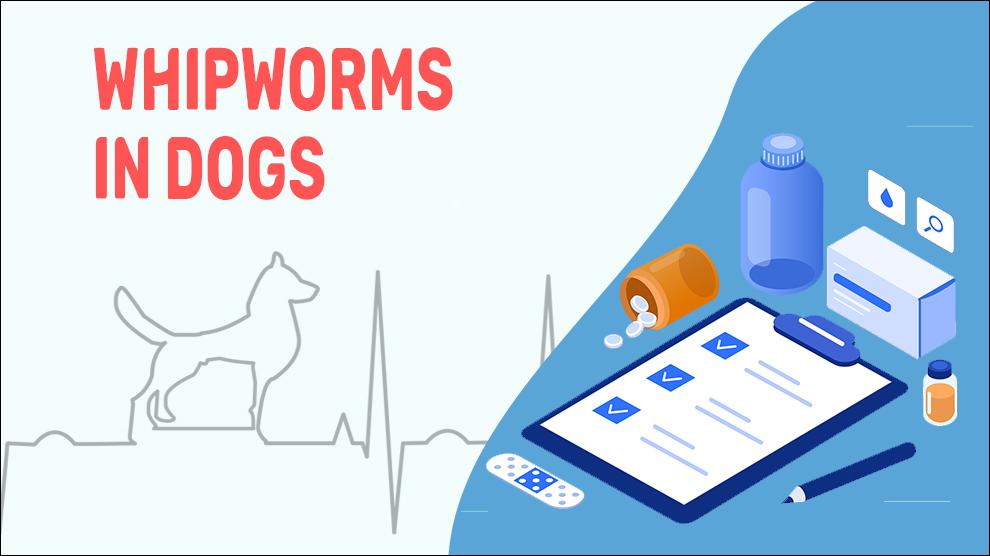What Is Whipworms In Dogs?
Whipworms belong to the “unholy trinity” of intestinal parasites in dogs—that includes hookworms and roundworms. Whipworm (Trichuris Vulpis) is the third most prevalent occupant of the unholy trinity, however, the one that owners disregard the most. The least “respected” of the GI nematodes of dogs is the whipworms, but there is a great possibility that you will encounter them at least once in the dog’s lifetime.
Whipworms, are appropriately named for their distinct whiplike appearance, wider handles at the posterior portion (reproductive portion), and a small anterior portion (esophagus). Adults inhabit the cecum (the region where small and large intestines convene) but in serious infections, they are also found in the large intestine. Just like roundworms, mature whipworms produce environment-resistant, barrel-shaped, thick-walled eggs, which are awfully hard to obliterate. These single-celled eggs develop into first-stage larvae (L1) within the egg in 12–15 days. When a dog consumes eggs containing infective L1, the larva seems to hang about in the upper portion of the small intestinal mucosa for the next 10 days and then pass to the cecum via the lumen. The prepatent period is about 3 months.
Different from roundworms, migration to other organs from the intestinal tract doesn’t happen in the case of whipworms; as a result, no in-utero passage of larvae to pups, no trans-mammary migration, and there is no somatic transmission into tissues. Whipworms are usually diagnosed in dogs older than 5 months due to their long pre-patent time.
Typically, when dogs swallow infective whipworm eggs in soil or other substances that may contain dog feces, they get infected. After development into mature adults, they embed themselves in the gastrointestinal mucosa to feed and cause acute and chronic large bowel diarrhea and abdominal discomfort.
Symptoms Of Whipworms In Dogs
- Abdominal tenderness and pain
- Bad breath
- Soft and/or bloody stools
- Refusing to eat
- Temporarily reduced appetite
- Weight loss
Treatment Options For Whipworms In Dogs
Deworming medication (anthelmintics): Broad-spectrum anthelmintics: many drugs in the benzimidazole class (fenbendazole, albendazole, mebendazole, flubendazole, thiabendazole, oxibendazole) or pro-benzimidazoles drugs (netobimin, thiophanate, febantel)
Cyclic depsipeptides: Emo depside
Macrocyclic: Moxidectin, milbemycin oxime
Oral deworming drugs: Drontal Plus, Panacur and Fenbendazole
Home Remedies For Whipworms In Dogs
- Provide your dog with a highly wholesome diet
- Try digestive enzymes and probiotics
- Add trace minerals to your dog’s food such as (Himalayan pink salt or sea salt)
- Use natural purgatives: Black cumin seeds, Ground-up raw, organic pumpkin seeds, fennel, squash, cucumbers, and grated carrots
- For digestive support, use chamomile and administer it as a glycerin tincture in your dog’s mouth
How To Prevent Whipworms In Dogs?
- All puppies should be given initial treatments (> 4 weeks of age)
- Adult dogs: Fecal flotation test yearly twice is good to identify potential intrusions
- Try Monthly worms preventive medication and annual dewormer protocol for adult dogs
- Always maintain good sanitary and hygienic conditions in your home. Occasional clean-up of your garden or front yard restricts household exposure to infected fecal matter, contaminated host animals, soil, or water
- At the time of acquisition of new dogs- whatever may be the age or ancestry, make sure to follow an immediate dewormer
Affected Dog Breeds Of Whipworms
There is no breed predisposition. Puppies are overrepresented.
Causes And Prognosis For Whipworms In Dogs
1. Causes:
An adult dog gets a parasite through the fecal-oral route- when it licks or consumes contaminated food, feces, water, or soil.
2. Mortality:
Whipworms are rarely serious for adult dogs whereas it is self-limiting in adult dogs, they are only a matter of concern in weak, immunosuppressed, or debilitated animals.
3. Diagnosis
- A complete blood count (CBC), chemistry profile
- Fecal flotation
- Urinalysis
4. Prognosis:
Once treatments have begun for Dogs with a mild infestation, rapid recovery can be guaranteed. Chronic infestation may take a longer time for the dog to get well.
Adherence to the veterinarian's treatment protocol and intake of medications appropriately is mandatory. Antiparasitic medications are typically repeated in the next month to break the worm’s life cycle and the pets don't contract it again from the same source.
When To See A Vet For Whipworms In Dogs?
Contact your vet right away, if you notice any of the following:
- Abdominal tenderness and pain
- Bad breath
- Soft and/or bloody stools
Food Suggestions For Whipworms In Dogs
- Whole, unprocessed foods or Nutrient-dense and biologically suitable foods
- Switch temporarily to a Bland Diet- with three parts plain cooked rice +1part boiled lean hamburger
- 3 parts rice or cooked macaroni + One-part boiled egg or cottage cheese with easily digestible lean cuts of meat
- For sensitive stomach dogs: Low amounts of fat, add probiotics and plenty of fiber ingredients (whole grain bread, cereal, Beet Pulp, etc)
- Probiotics (yogurt, fermented vegetables, kefir with live cultures, kimchi)
Conclusion
Whipworm doesn’t pose a significant risk to humans as they are exclusive to domestic and wild canine species. Different from other parasite eggs, whipworm eggs are really vulnerable to drying out (desiccation) and thus perish rather than going dormant. Always maintain a clean, dry home environment and keep a watchful eye on your dog’s outdoor activities reducing the possibility of re-infection.

















